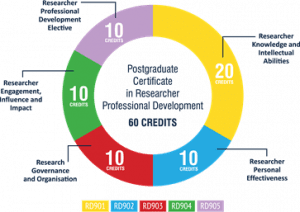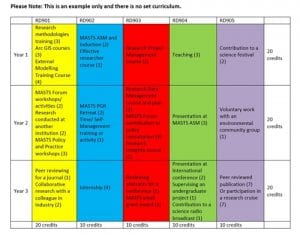The MASTS Postgraduate Certificate in Researcher Professional Development for Marine Science and Technology (MASTS PG Cert) is designed to enhance the professional and personal skills of the MASTS Graduate School members, through a bespoke programme of activities chosen by the student and contextualised to marine science and technology. The programme is validated by the University of Strathclyde which will award the certificate.
All new MASTS funded PhD students can take part, and programme fees will be covered by MASTS. Current members of the MASTS Graduate School, including Associate Members of the MASTS Graduate School and those in receipt of a bursary will also be eligible to enroll free of charge, providing they have been registered for a PhD for 12 months or less. Other postgraduate students or Early Career Researchers in marine or related disciplines can apply to MASTS to become Associate Members of the Graduate School and take part in the PG Cert on payment of the current Graduate School and PG Cert programme fees.
For information on current fees please contact Emma Defew for more details.

In order to receive an award, PhD students are required to undertake 60 credits worth of appropriate development activities over the duration of their research degree studentship. Each credit is notionally equivalent to 10 hours of study. Credits can be accumulated across five classes, each with a distinct focus, recognised as important to your research and career:
Four of the classes are aligned to the Vitae Researcher Development Framework’s domains, whilst the fifth class is an elective to allow you to explore any of these areas in more detail.
In addition, MASTS is a community of researchers who possess highly developed intellectual abilities, knowledge, skills, behaviours and competencies relevant to marine research, as well as a breadth of transferrable skills and we encourage professional development of our postgraduate researchers contextualised to marine science and technology. MASTS has therefore defined a number of core activities that support development of skills and attributes specifically for the marine sciences and these can contribute to credit accumulation in different classes
The MASTS PG Cert is not designed as an additional workload for students, but is a formalisation of the existing research and researcher development training that eligible PhD students will undertake as part of their doctoral programme.
How each student accumulates the credits for each class is unique, and therefore there is no formal curriculum and no timetable. With consideration to your own research, the Vitae RDF, the skills and attributes of a marine science professional and your aspirations for the future, you select the activities that meet your needs, at a time that suits you. You decide on the programme of activities to undertake, relevant to your research, marine science and technology more broadly and your own personal and professional development. One credit is equivalent to a nominal 10 hours of active learning.
You can take part in MASTS core activities and also undertake training in your department or faculty at your registering university or in other institutions and organisations. The real innovation behind the MASTS PG Cert is the ability for you to include experiential learning opportunities in the programme, offering great flexibility in how you evidence your continuing personal and professional development. Almost anything can contribute to the MASTS PG Cert, providing you can demonstrate learning that benefits your research or career. Each activity is mapped to one of the five PG Cert classes and assigned a notional number of credits. One credit is equivalent to a nominal 10 hours of active learning, regardless of the type of activity. You can discuss the credit allocation of any activity with the Course Coordinator prior to undertaking an activity and when you submit a reflective assessment, you should indicate how many credits you believe you have achieved. The final allocation will be made by the Course Coordinator when you submit a successful reflective assessment together with associated evidence
Students are expected to achieve at least 20 credits in each year and this can be split over any of the five classes. You must successfully accrue 60 credits over approximately three years. You should undertake training most appropriate to your development needs, making use of the wide range of opportunities available to you. You should discuss your training plan with your supervisor, and present your progress during any review meetings you have with your supervisory team. You must complete all five classes successfully in order to achieve the PG Cert award.

MASTS will e-mail information about events to the MASTS community and all students enrolled on the MASTS PG Cert.
Some activities may only be offered once or have limited places so please book well in advance to avoid disappointment. If you need to cancel, please give the activity organiser as much notice as possible. MASTS activities run throughout the year and range from half day sessions through to more intensive one or two-day residential workshops. There are intensive events which occur annually, such as the PGR Retreat and the MASTS Annual Science Meeting, which you are strongly encouraged to attend. Event dates and descriptions are listed in each activity descriptor.
Activity information will be e-mailed directly to you, but you can also source other courses, training and activities which are not listed but which have relevance to you.
Your university graduate school or postgraduate skills development programme will also offer training, events and professional development activities, including on-line courses which you can work through at your own pace. You can access information and book these through the normal processes defined by your university.
MASTS students wishing to attend a workshop at a university, other than their registering university, can request a place by contacting that university directly and attendance will be confirmed by the hosting organization (course fees may apply).
Please do pass on details of opportunities for training or other relevant activities that you come across to Dr Emma Defew who will share these with the MASTS PGR community
The following people will be pleased to assist with any questions you have:
o Dean of the MASTS Graduate School, Dr Lois Calder
o Deputy Dean of the MASTS Graduate School, Dr Emma Defew
MASTS was founded in 2009 to be a unique collaboration between marine research organisations, government and industry.
Charity Number: SC045259
Company Number: SC485726



We’re working behind the scenes to bring you a suite of useful, and updateable, resources including:
If you would like to be updated when the resources section is live please let us know.